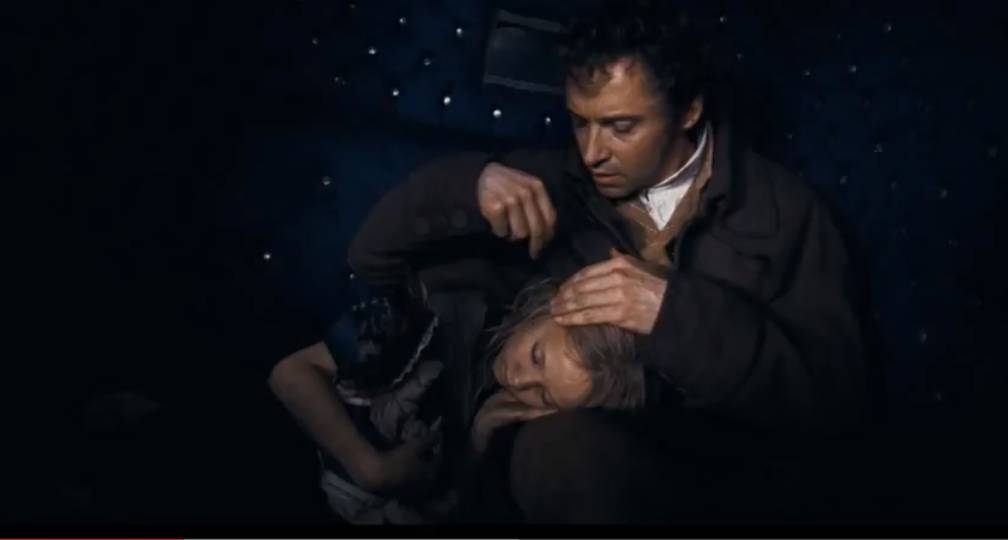
After a bru tal series of Christ mas shifts working in the Emergency Room, I had finally come home for the hol i days. My mother and I were in the kitchen, talk ing like we used to. We had seen and loved the new Les Mis er ables film, and so I brought up an inter est ing ques tion from an inter view with Saman tha Barks, who played Eponine:
Inter viewer: I think aside from “I Dreamed a Dream”, “On My Own” is prob a bly one of the most loved songs of the musi cal, and I think it’s fas ci nat ing that the two most rec og nized and loved are just the two most heart break ing songs, so what does it say about us as an audi ence that the songs that we con nect with are the most heart break ing songs?
My mother was quiet as she thought about it. “I think,” she said, “that it is some thing we all share in com mon. We all suf fer, and know what it means to lose a dream or to be dis ap pointed. We all know how it feels.”
In those moments, I was reminded of how much of her life and our fam ily his tory was filled with a tragedy not too differ ent from that of Les Mis er ables. Half of our fam ily tree was miss ing or unknown, scat tered and wiped out dur ing the war in China. My grand par ents’ his to ries were char ac ter ized by their flight from the war: watch ing mas sacres of school mates while hid ing in the bushes, step ping on dead bod ies to avoid land mines, being traf ficked via hay carts and ships in order to seek refuge abroad. My par ents grew up in the grind ing poverty of rural vil lages, their child hood over shad owed by the threat of immi nent war, their edu ca tion grimly dri ven by the hope of an oppor tu nity to emi grate to the US so that they could form a fam ily here . . . so that their future chil dren —mean ing I —could have a bet ter life.
With out know ing my thoughts, my mother spoke again. “I really like that song from the car riage’ where he has the lit tle girl sleep ing in his lap and real izes that every thing is dif fer ent now he has a child.” She paused. “You know, every thing is dif fer ent when there is a child. Your whole world changes.”

*****
“I have had this all my life, and I am going to get wid of it!”
“Rid of it,” her ther a pist corrected.
“W-right.” She turned her head to grin at us, and I couldn’t stop smil ing. We were all lying on exer cise mats in the ther apy rooms because, as the ther a pist taught us, we could use “gwav ity” to help roll those “r’s” bet ter. I was sure she was one of the therapist’s favorite patients: dili gent, focused, and with a per son al ity com posed entirely of laugh ter and light. In less than fif teen min utes, through lis ten ing to her “chawming pwonun-sheation,” I had already named her as a favorite. Few of my lit tle patients were as mature, knowl edge able, and thrillingly artic u late at the dig ni fied age of seven.
And in that moment, I thought about the New town mas sacre and the fact that there must have been pre cious lit tle dif fer ence between any of those chil dren and this young girl who was now sprin kling glit ter on a craft snow man, that even the best and bright est of us still live in that same world of terrors.
*****
My mother spoke again. “My favorite song is that one Jean Val jean prays, about bring ing him home . . . it is such a beau ti ful prayer. He says, ‘You can take, you can give . . . If I die, let me die; let him live . . . bring him home.’”
We talked some more, then she said this: “Life is filled with such suf fer ing, you know. There is so much sor row . . . but there are moments when God saves.”
That night, I went to my old bed room and pulled a stack of jour nals off the book case. They were etched eight, nine, ten years ago with an illegible scrawl that reflected the tired and stress-filled times they were writ ten in. I leafed through the many yel lowed pages of thought-scratch, reliv ing those moments of anx i ety and worry. So many of them were des per ate calls to God about things I no longer remem ber now, reflect ing cri sis after cri sis that seem triv ial and incon se quen tial now. I wanted to laugh at the lit tle boy, at his deep inse cu ri ties and obses sion with doubt and suf fer ing, and say, “You haven’t seen any thing yet.”
But I didn’t because I real ized that even I, the same boy a decade later, am still immersed in my own world of sor rows, con flicts, despair, and cyn i cism. At times of newness and regeneration, like spring and especially Easter, we are hope ful that the old wounds of our past will heal, that we can assume a new and a fresh start, that the world will be a bet ter and brighter place . . . if not for us, then at least for our chil dren, the icons of inno cence and hope. But this belies the expe ri ences of our own sor did his tory as human ity and as indi vid ual humans. Is our redemp tion progres sive? Does any thing ever change? Are our cries for sal va tion heard?

Henri Nouwen writes about this in his last book, Can You Drink the Cup?, scripted dur ing his final years as min is ter at l’Arche Day break, a com mu nity of those with intel lec tual disabilities:
There is Tracy, com pletely par a lyzed, but with a bright mind, always strug gling to find ways to express her feel ings and thoughts. There is Susanne, not only men tally dis abled but also reg u larly bat tered by inner voices that she cannot con trol. There is Loretta, whose dis abil ity causes her to feel unwanted by fam ily and friends and whose search for affec tion and affir ma tion throws her into moments of deep despair and depres sion. There are David, Fran cis, Patrick, Jan ice, Carol, Gordie, George, Patsy . . . each of them with a cup full of sorrow . . .
And for me things are not very dif fer ent. After ten years of liv ing with peo ple with men tal dis abil i ties and their assistants, I have become deeply aware of my own sorrow-filled heart. There was a time when I said: “Next year I will finally have it together,” or “When I grow more mature these moments of inner dark ness will go,” or “Age will dimin ish my emo tional needs.” But now I know that my sor rows are mine and will not leave me. In fact I know they are very old and very deep sor rows, and that no amount of pos i tive think ing or opti mism will make them less. The ado les cent strug gle to find some one to love me is still there; unful filled needs for affir ma tion as a young adult remain alive in me. The deaths of my mother and many fam ily mem bers and friends dur ing my later years cause me con tin ual grief. Beyond all that, I expe ri ence deep sor row that I have not become who I wanted to be, and that the God to whom I have prayed so much has not given me what I have most desired . . .
Whose cup is this? It is our cup, the cup of human suf fer ing. For each of us our sor rows are deeply per sonal. For all of us our sor rows, too, are universal . . . Jesus, the man of sor rows, and we, the peo ple of sor row, hang there between heaven and earth, cry ing out, “God, our God, why have you for saken us?” . . .
In his immense lone li ness, he fell on his face and cried out: “My Father, if it is pos si ble, let this cup pass me by” (Matthew 26:39). Jesus couldn’t face it. Too much pain to hold, too much suf fer ing to embrace, too much agony to live through. He didn’t feel he could drink that cup filled to the brim with sorrows.
Why then could he still say yes? I can’t fully answer that ques tion, except to say that beyond all the abandon ment expe ri enced in body and mind Jesus still had a spir i tual bond with the one he called Abba. He pos sessed a trust beyond betrayal, a sur ren der beyond despair, a love beyond all fears. This inti macy beyond all human inti ma cies made it pos si ble for Jesus to allow the request to let the cup pass him by become a prayer directed to the one who had called him “My Beloved.” Notwith stand ing his anguish, that bond of love had not been bro ken. It couldn’t be felt in the body, nor thought through in the mind. But it was there, beyond all feel ings and thoughts, and it main tained the com mu nion under neath all dis rup tions. It was that spir i tual sinew, that inti mate com mu nion with his Father, that made him hold on to the cup and pray: “My Father, let it be as you, not I, would have it” (Matthew 26:39).
Jesus didn’t throw the cup away in despair. No, he kept it in his hands, will ing to drink it to the dregs. This was not a show of willpower, staunch deter mi na tion, or great hero ism. This was a deep spir i tual yes to Abba, the lover of his wounded heart. . . .
Our cul ture tends towards an inflex i ble sense of opti mism and human ism. We are con vinced that true joy and human actu al iza tion must come through the erad i ca tion of pain, suf fer ing, and sor row. It comes as lit tle sur prise then that we hide away the sick and suf fer ing in hos pi tals and men tal insti tu tions and ghet toes, or that con ver sa tions about suf fer ing are branded as cyn i cal and faux pas (unless they revolve around the trivial). It is only log i cal that our per spec tive on hope is sen ti men tal and, when bru tally chal lenged by events like New town or other cor rup tions of inno cence, eas ily sus cep ti ble to cyn i cism and despair.
In the per son of Jesus Christ, whose entrance into the world was hum ble and threat ened by scan dal and vio lence, we are reminded that hope must be divine. It must derive itself from the exter nal, the invis i ble, and the eter nal if it is to pose any help to our intractable, super fi cial, and fickle human ity. It can not be the mere absence or abo li tion of suf fer ing; it must engage it, over come it, trans form it. It does not begin from a posi tion of strength or intim i da tion; it starts with weak ness so that it might express itself in desire and, through satisfaction, bring joy. It has no ground ing in ide al ism, the ory, or abstrac tion; it instead comes from the close ness, the sweet ness, and the affec tion of Jesus Christ, the incar na tion of all we hope for.
It is this recog ni tion of Christ’s pres ence in the hard ness of life that brings us lib erty and enables us to hope freely and chal lenge the dark ness of cyn i cism, unbur dened by the restric tions of sen ti men tal ity and its incon gruity with real ity. We can live and thrive in the dark est cor ners of the hos pi tals, nurs ing homes, men tal insti tu tions, funeral homes, labor camps, and ghet toes sim ply because Jesus says he lives and thrives there as well . . . because he has risen and resurrected from the grave.
“Then the King will say to those on his right, ‘Come, you who are blessed by my Father; take your inher i tance, the king dom pre pared for you since the cre ation of the world. For I was hun gry and you gave me some thing to eat, I was thirsty and you gave me some thing to drink, I was a stranger and you invited me in, I needed clothes and you clothed me, I was sick and you looked after me, I was in prison and you came to visit me.‘
“Then the right eous will answer him, ‘Lord, when did we see you hun gry and feed you, or thirsty and give you some thing to drink? When did we see you a stranger and invite you in, or need ing clothes and clothe you? When did we see you sick or in prison and go to visit you?’
“The King will reply, ‘I tell you the truth, what ever you did for one of the least of these broth ers of mine, you did for me.’” — Jesus (Matthew 25)
For you did not receive a spirit that makes you a slave again to fear, but you received the Spirit of sonship. And by him we cry, “Abba, Father.” The Spirit him self tes ti fies with our spirit that we are God’s chil dren. Now if we are chil dren, then we are heirs—heirs of God and co-heirs with Christ, if indeed we share in his suf fer ings in order that we may also share in his glory. —Romans 8
I want to know Christ and the power of his res ur rec tion and the fel low ship of shar ing in his suf fer ings, becom ing like him in his death, and so, some how, to attain to the res ur rec tion from the dead. — Philip pi ans 3
Geno cide, mas sacre, poverty, dis ap point ment, cru ci fix ion, famine, naked ness, death, or sword; together with Christ, with the fel low ship of suf fer ing and the drink ing of its cup to its dregs, we shall have our over com ing. Some how, we shall attain.
He is Risen! He is Risen indeed.

David graduated from Princeton University with a degree in Electrical Engineering and received his medical degree from Rutgers – Robert Wood Johnson Medical School with a Masters in Public Health concentrated in health systems and policy. He completed a dual residency in Internal Medicine and Pediatrics at Christiana Care Health System in Delaware. He continues to work in Delaware as a dual Med-Peds hospitalist. Faith-wise, he is decidÂedly Christian, and regarding everything else he will gladly talk your ear off about health policy, the inner city, gadgets, and why Disney’s Frozen is actually a terrible movie.

Thank you, David. I was struck by your “China” comment; I am currently teaching in Beijing. I have posted some photos of Easter and Good Friday on our school’s Facebook page, Beijing No. 2 Middle School, International Division. You may wish to consider the abandonment you write of here, alongside the kenotic theology found in Philippians. I am pondering this right at this moment: is there at all a connection between abandoning and emptying?